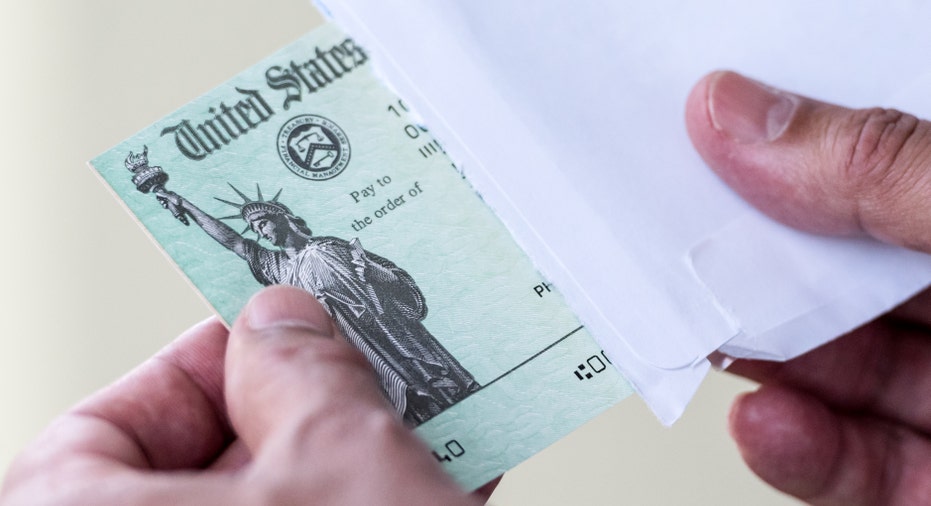Coronavirus stimulus checks arriving — should you use it to pay off debt?

Coronavirus stimulus money is on the way - but how should you use it? (iStock)
Just a few weeks ago, the U.S. government passed a record-breaking stimulus bill worth $2.2 trillion. And soon (if they haven't already) many Americans will see their cut of it.
The stimulus package, aimed at reducing the financial stress caused by the COVID-19 pandemic, will issue $1,200 “economic impact payments” to all eligible individuals, or $2,400 for eligible married couples.
The exact amount of money taxpayers qualify for depends on the adjusted gross income reported on their last tax return. If it’s under $75,000 (filing single) or $150,000 (filing jointly), you get the full payment. If you make above these limits, your payment is reduced $5 for every additional $100 you make. Parents also get a $500 payment per child, regardless of income status.
FED CUTS INTEREST RATES AGAIN — WHY YOU SHOULD REFINANCE DEBT NOW
Do you know what you’ll do with yours when it arrives? Here’s what experts recommend.
Should you pay off debt with your coronavirus stimulus check?
A recent survey shows that 43 percent of Americans plan to use their stimulus money to pay off debt. Is that the right move for you, though? That depends on your financial situation, as well as the interest you’re paying on those debts.
According to Kelley Long, a consumer financial education advocate at the American Institute of CPAs, basic needs and your emergency fund need to come first. But if those are covered, then moving on to debts is smart — especially higher-interest ones like credit cards.
“If you've got enough in savings to sustain you through a potential job loss, but you still have higher-interest debt such as credit cards or private student loans, your payment would have the most impact paying this down faster,” Long said. “And, even if you have debt with lower interest rates but you have sufficient savings, consider paying off that debt as well. Often, you’re paying more interest on your debt than any interest you’d receive in a savings account, so financially speaking, paying off debt is often wise.”
FED'S EMERGENCY RATE CUTS AFFECT YOUR CREDIT CARD — HERE'S HOW
If you have credit card debt, at the very least, use some of your stimulus money to make your minimum payments. This will help you avoid late fees and protect your credit (not to mention your financial health) in the long run.
A zero-interest balance transfer credit card is also an option to buy some time, and if you have debt beyond credit cards, refinancing and consolidating are also routes you might want to explore.
Best ways to use your coronavirus stimulus check
Beyond paying off debts, there are a number of other ways you can use that stimulus money once it hits. Obviously, paying your bills and covering your household’s essential needs are priority No. 1, but after that, you might consider:
1. Boosting your emergency savings.
You might have a little cash stowed away, but is that enough if your wages are cut, or the pandemic goes on much longer? If you’re unsure, you may want to funnel some stimulus money toward your savings account.
According to Steve Pilloff, assistant professor of finance at the George Mason University School of Business, thinking ahead is critical here. “The payouts are not especially large, and the pandemic looks likely to persist for a while. Although the government is likely to spend trillions of dollars to support individuals and businesses, at some point, such assistance will no longer be affordable. That's when having something to rely on could mean the difference between eating and being hungry, or possibly having a roof over your head or not.”
2. Stocking up.
You might also want to use those funds to stockpile some necessities. Not only can this help if your financial situation changes, but it can also aid in social distancing efforts.
“Stocking up on some food and other necessities may be a good idea as well, as it can allow people to remain safely at home for longer stretches than when regular shopping is necessary, which could slow the spread of the virus,” Pilloff said.
3. Investing in smart stocks and index funds.
Recent market volatility has made for some good investment opportunities — but only if you don’t need the funds elsewhere during the pandemic.
CALCULATE YOUR DEBT-TO-INCOME RATIO AND FIND OUT WHERE YOU STAND
Here’s what Anderson Lafontant, senior advisor of advanced planning at Miracle Mile Advisors, recommends: “Take the bulk of your stimulus check and invest in broader markets. Given that equities have pulled back from their highs and there will likely be downside, this will probably present some great entry points into stocks. Think about investing in ultra-low-cost index funds both in the U.S. and internationally.”
She also encourages buying stocks in companies that thrive in a “socially-distant economy” — ones like Zoom, Netflix, Peloton and Amazon.
4. Fund your retirement account or HSA.
Another option is to funnel some stimulus money into your health savings account, 401(k), or IRA. Since the IRS has extended the filing deadlines for 2019 returns, these contributions could still reduce your taxable income and potentially increase your refund once you file.
What you should know about the coronavirus stimulus payments
Stimulus checks started going out in mid-April. If you’ve linked a bank account to receive your tax refund in the past, yours will be paid via direct deposit. If there’s no account linked, you can head to IRS.gov/Economic-Impact-Payments to input your banking details.
As a last resort, you can also opt to receive a check in the mail at your last known address, though this may take significantly longer than a direct deposit.




















